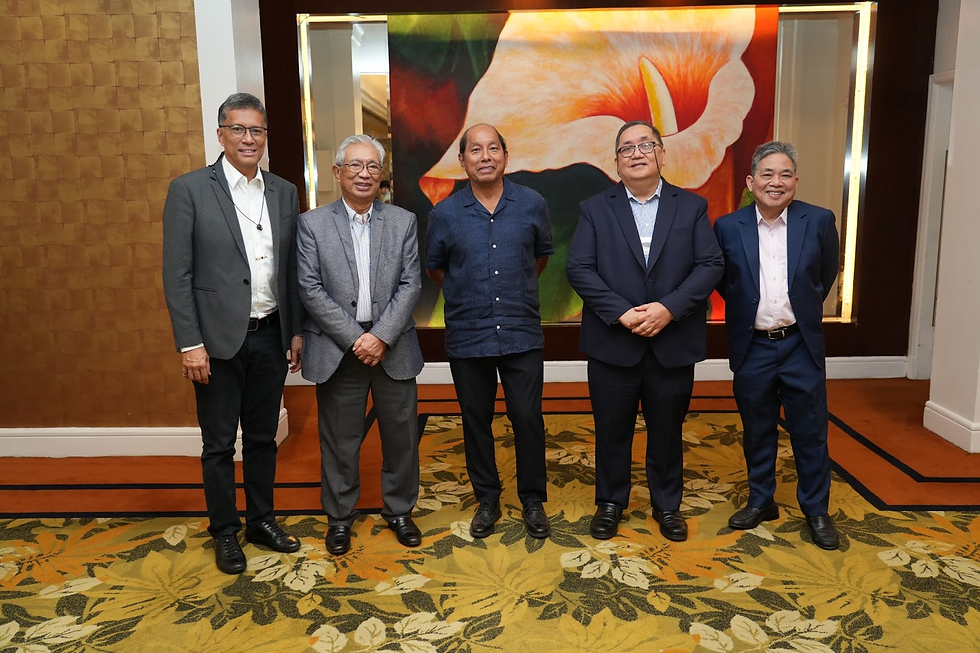POLICY FORUM ON LOCAL ECONOMIC DEVELOPMENT
- Action for Economic Reforms
- Aug 18, 2009
- 4 min read
This is from The Good News by Rorie Fajardo published in the website of the Philippine Human Rights Reporting Project .
As recent headlines tell about President Gloria Macapagal Arroyo’s alleged USD 20,000 dinner in a New York City restaurant while millions of Filipinos go hungry, a low-key forum last week gathering heads of local governments from north to south of the Philippines showed that the country still has a wealth of stories on good governance, transparency and accountability.
The Policy Forum on Local Economic Development, organized by the non-government Galing Pook Foundation, gathered in Makati City about 15 local government leaders whose programs in their respective provinces, cities or towns have shown that amid the deep-seated distrust on government people, there are local government units (LGUs) who keep making good in helping their people enjoy the fruits of meaningful socio-economic growth, good health and clean environment.
What was remarkable in the forum was that the LGU executives came from different political leanings. Some even came from opposing political parties or for a certain time, were direct political opponents. But what bound them was the recognition, through Galing Pook’s annual awards in good governance, of their programs in recent years for effectively addressing local economy, health of the people, environmental issues and declining agricultural conditions brought about by unsustainable practices.
One of those present was the beleaguered Governor Eddie Panlilio of Pampanga, whose quarrying operations in the province brought in PhP 230 million in taxes in 2008 alone compared to the measly PhP 22.5 million yearly, after his administration “cleaned” the operations and accounting. Panlilio, the independent priest-candidate who miraculously defeated President Arroyo’s allies in the 2007 elections, has not ceased to face recall issues and lack of support from incumbent local officials identified with the ruling party.
Also present was Albay Governor Joey Salceda, who presented how the province under his watch was able to adjust its programs in line with the poverty-busting UN Millennium Development Goals (MDGs). Salceda is identified with the administration, also serving as President Arroyo’s senior economic adviser. In 2008, Galing Pook awarded Albay LGU under his watch for its effective program on disaster risk reduction, thereby saving more lives and property and reducing poverty despite having at least three typhoons yearly and facing volcanic eruptions.
Salceda gave the audience one of the most important ingredients of enjoying transparent and accountable governments: institutionalizing government agencies and offices, which we all know are always at the mercy of political persuasions here in the Philippines.
“We should help in the institutionalization of our LGUs. You don’t have to remove employees and staff every now and then merely because they are not your so-called people,” Salceda said, adding that when he first won as governor, he never revamped employees of his predecessor.
While he admitted that we are already at a point where the people no longer trust their officials no matter how honest and good they are in terms of work, Salceda believed corruption would effectively be eradicated if all LGUs would be enforced to simply focus their governance in achieving the MDGs.
The forum presented other stories that raise hopes despite having a long and sometimes frustrating path in fighting corruption: the Bulacan government’s effort to change the image of cooperatives from vehicles of corruption to conduits of poverty alleviation and development; organic bio-dynamic agriculture to address low productivity and environmental strain in Trento, Agusan del Sur; Isabela province’s rice and corn price subsidy program; and resource and manpower sharing of six towns in North Cotabato to build and protect their farm-to-market roads instead of heavily relying on national road projects that are allegedly ridden with under-the-table transactions and commissions.
Cielito Habito, former National Economic Development Authority (NEDA) director, summed up what these good governance practices show: that LGUs can do it better, and that effective solutions don’t need to be costly nor sophisticated.
Habito said LGUs could do it better precisely because they know the problems better, they have available resources, and previous practices say so. “The key requisites: transparency and accountability. When there is success, we know who to affirm,” said Habito, now professor at the Ateneo Center for Economic Research and Development.
Effective solutions to socio-economic problems, he said, are readily available: diversified organic farming to increase yield and lessen environmental damage, tapping natural resources, and increasing capacities of local people.
Solita Monsod, founding chair of the Philippine Human Development Network, reminded LGU officials the power they have in their hands which should be used properly: “LGUs should harness the potential power of the people they serve. There should be genuine consultations. Sometimes, we tend to think we are at the bottom end and become objects of our own largesse.”
Monsod stressed that getting reelected and achieving genuine development for the constituents are two objectives which many politicians have segregated but in fact could be married. One could easily get reelected as long his people see him bring changes and results for their development. “Once you buy yourself into power, then you are stuck. But you could get reelected even with less money as long as you harness the potentials of the people.”
While these are all good news, I fully agree with Action for Economic Reforms head Men Sta. Ana’s point that our country need not just enjoy “pockets” or “islands” of good governance, but rather an archipelago of good governance. LGU efforts must not be isolated but in fact be coherent with each other and hopefully with the national agenda. After all, promoting good governance and transparency is a collective effort.



